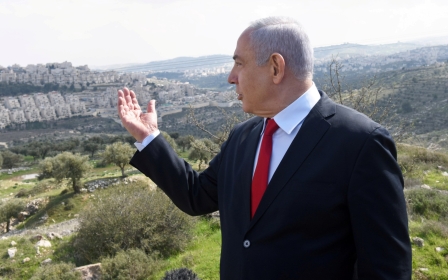Netanyahu says Palestinians in annexed land will not be offered Israeli citizenship

Israel's Prime Minister Benjamin Netanyahu said in an interview published on Thursday that Palestinians living in areas of the occupied West Bank he eyes for annexation will not become Israeli citizens.
Instead, he told pro-government newspaper Yisrael Hayom that the Palestinians will live in isolated communities ruled by the Palestinian Authority, surrounded by territory considered Israeli.
Israel's new unity government is promising to bring forward legislation that would see the country annex swathes of the West Bank - likely the Jordan Valley and illegal Israeli settlements - in contravention of international law.
The Jordan Valley and the northern Dead Sea make up about one-third of the West Bank, almost 2,400 square kilometres where nearly 65,000 Palestinians reside.
The city of Jericho will not be annexed, Netanyahu said, but Palestinian towns in the area will be under Israeli security control.
Stay informed with MEE's newsletters
Sign up to get the latest alerts, insights and analysis, starting with Turkey Unpacked
"They need to acknowledge that we control security in all areas," he said.
When Israel has unilaterally annexed territory before - namely occupied East Jerusalem and the Syrian Golan Heights - it has offered citizenship to residents there. However, only a fraction have taken up Israeli citizenship over the decades.
Israel's planned annexation of the Jordan Valley: Why it matters
+ Show - HideThe annexation of the Jordan Valley could effectively kill whatever hopes remain for a two-state solution to the Israel-Palestine conflict as it would render completely impossible the establishment of a viable, contiguous Palestinian state.
In April, Prime Minister Benjamin Netanyahu reached an agreement with his rival Benny Gantz to form a unity government that seek to impose Israeli sovereignty over the Jordan Valley. Legislature could be discussed from 1 July.
The Jordan Valley accounts for around one-third of the occupied West Bank (almost 2,400 square kilometres), where 30 Israeli agricultural settlements house around 11,000 settlers.
Some 56,000 Palestinians also reside in the Jordan Valley, including in the city of Jericho, where their daily lives are deeply impacted by Israeli occupation policies.
The area is rich in minerals and agricultural soil and is a highly strategic area, as it lies along the Jordanian border.
Jordan, the Palestinian Authority in Ramallah, and senior officials in the European Union openly oppose the annexation plan, while the administration of US President Donald Trump has encouraged such moves.
Netanyahu once again said Israel has a "historic opportunity" to annex land in the West Bank. The administration of US President Donald Trump openly backs the move, though has urged it be made in conjunction with talks with the Palestinians over an independent Palestinian state.
The Israeli premier noted that diplomatic plans presented to him previously have asked Israel to concede land, "return to the 1967 borders and divide Jerusalem" - as well as take in Palestinian refugees.
Now, he told Yisrael Hayom, this is not being asked of Israel.
"This is a reversal," he said, referring to the right of Palestinian refugees to return to historic Palestine.
"We aren't the ones being forced to make concessions, rather the Palestinians are, regardless of negotiations."
The West Bank's Jordan Valley is rich in minerals and agricultural soil and is a highly strategic area, as it lies along the Jordanian border.
Since World War II, there have only been three cases of annexation throughout the world: Iraq's invasion of Kuwait in 1990; Russia's annexation of Ukraine's Crimea in 2014; and Israel's seizing of Arab territories, including the Syrian Golan Heights and Lebanon's Shebaa Farms, since 1967.
Middle East Eye delivers independent and unrivalled coverage and analysis of the Middle East, North Africa and beyond. To learn more about republishing this content and the associated fees, please fill out this form. More about MEE can be found here.





